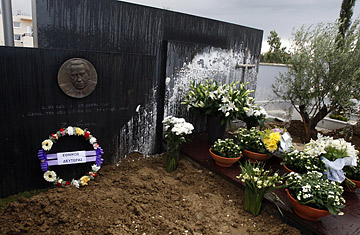
Flowers and wreaths cover the empty grave of former Cypriot President Tassos Papadopoulos
Though bitterly divided for 35 years, the Greek and Turkish communities on the Mediterranean island of Cyprus share an islander's love of conspiracy theories. But the macabre theft of the remains of a hard-line Greek Cypriot President from his grave on Friday has even the most far-out pundits stymied. Was it politically motivated? For ransom? Was a mysterious gang of Romanian grave robbers involved?
Police say they have no leads on the disappearance of Tassos Papadopoulos' body from a quiet village cemetery. The timing of the theft, everyone agrees, is troubling, coming on the eve of a renewed push to finally bring down the bullet-riddled walls that make Cyprus' city of Nicosia Europe's last divided capital.
The clock is ticking for reconciliation. In April, dove-ish Turkish Cypriot leader Mehmet Ali Talat is up for re-election. If peace talks with Greek Cypriot President Demetris Christofias fail to produce any substantive development by then, he is likely to lose to a hard-liner opposed to negotiations. That could close the door indefinitely on what observers agree is the island's latest and best shot at peace in three decades.
The island has been partitioned since 1974, when Turkish troops invaded the north in response to a coup in Nicosia backed by the military junta then ruling Greece. Numerous international peace plans have since been floated — and failed — but several factors conspire to make this a moment of opportunity. "There is reason to be more optimistic than ever before," says Metin Munir, a Turkish Cypriot political commentator. "The biggest change is that Turkey, a dominant party in the conflict, now wants a solution. They are willing to compromise."
Turkey maintains some 35,000 troops in the north but the Turkish government of Prime Minister Recep Tayyip Erdogan recognizes that divided Cyprus is a potential embarrassment to its new-found ambitions to become a regional power. It also threatens to derail Ankara's long-standing —albeit slow-moving — bid to join the European Union. The E.U. has frozen discussions on eight of the 35 policy chapters towards membership since December 2006 to punish the Turks for not opening their ports and airspace to Cypriot vessels as required. At a summit last week, the E.U. agreed to open just one new chapter — on the environment.
The E.U. is a complicating factor. The island's last major opportunity for resolution was arguably lost when Brussels accepted Cyprus, as represented by its Greek Cypriot government, as a member in 2004, even though Greek Cypriots had rejected a painstakingly crafted U.N. peace plan in a referendum vote just prior. (Turkish Cypriots voted yes.) As a result, the Greek-Cypriot republic lost any incentive it might have had to speed up negotiations.
More tactically, the Greek Cypriots also gained E.U. veto power, which they threatened to use last week to block the opening of five new chapters in the negotiations for Turkey's membership next year. "The problem as far as a deal is concerned is that Greek Cypriots are basically content. As it stands they are an E.U. member, they're happy and prosperous," says Munir. "They know that any deal will inevitably entail some loss for them and they don't like that idea." The Greek Cypriot leader who presided over that fateful referendum was Tassos Papadopoulos, the hard-liner whose remains were bizarrely stolen and are still missing. He lost in 2008 to Christofias, a communist who ran on a pro-settlement campaign. Christofias and Turkish Cypriot leader Talat get along. Both are youthful, leftist, and also old trade union friends.
But, while both sides say they want to reunite Cyprus as a bicommunal federation, sticking points range from how power sharing would work to property grievances of tens of thousands of people who lost their homes in the conflict. About a quarter of Cyprus' population of around 1 million is internally displaced. Talks on the sensitive issues of property and security have barely inched forward since last year, despite twice-weekly meetings. The problem now is that time is running out for the Turkish Cypriot side. A deal, or at least a concrete roadmap, would have to be agreed by late February to be approved in time for Talat's election run. "The only way really to get the Greek Cypriots to move forward is pressure from outside," says Munir. "But the question is who could apply that?" It is also a delicate issue. Christofias last week complained that "our tragedy has its roots in intervention by outsiders" and some say the previous U.N. peace plan was rejected because Greek Cypriots felt it was imposed by foreigners.
In January the two leaders will get cozier, moving talks from an official building in the zone that divides them to each other's homes. Visiting the island last week with a group of peacemakers known as the Elders, former U.S. President Jimmy Carter said he was confident a deal was within reach and optimistic that both leaders were "completely determined to succeed". He knows better than most how elusive peace in Cyprus can be. Carter was responsible for the United States backing a 12-point Cyprus peace plan in 1978, which failed to produce results. Thirty years on, perhaps this time they'll finally get it right — if a missing corpse doesn't come between them.
